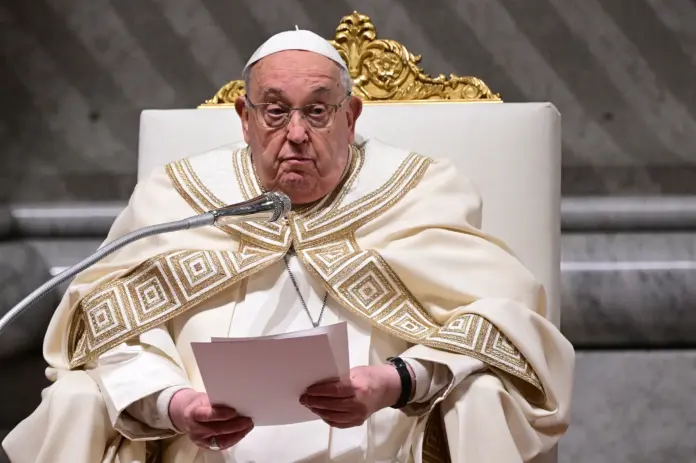April 21, 2025 — The Vatican has confirmed the passing of Pope Francis, the 266th pontiff of the Roman Catholic Church, on Easter Monday morning at 7:35 a.m. local time. He died peacefully in his residence at Casa Santa Marta in the Vatican at the age of 88. His death ends a transformative and at times tumultuous papacy that left an indelible mark on the Catholic Church and the world.
A Statement of Loss
The announcement was made by Cardinal Kevin Farrell, the Vatican camerlengo. “Dear brothers and sisters, with deep sorrow I must announce the death of our Holy Father Francis,” his statement read. “At 7:35 this morning the Bishop of Rome, Francis, returned to the house of the Father. His whole life was dedicated to the service of the Lord and His Church.”
Farrell praised Pope Francis as a man of fidelity, courage, and universal love — especially toward the poorest and most marginalized. “With immense gratitude for his example as a true disciple of the Lord Jesus, we commend the soul of Pope Francis to the infinite merciful love of the Triune God,” he said.
A Papacy Unlike Any Other
Born Jorge Mario Bergoglio in Buenos Aires, Argentina, on December 17, 1936, Pope Francis broke centuries of tradition when he was elected in 2013. He was the first Jesuit pope, the first from the Americas, and the first non-European pontiff in nearly 1,300 years. His election alone signaled a seismic shift for the Catholic Church.
But it wasn’t just his origin that made him a historic figure. Pope Francis spent his 12-year papacy radically rethinking the Church’s approach to social justice, poverty, and global issues like climate change and migration. A humble and soft-spoken leader, he chose not to live in the luxurious Apostolic Palace but instead took residence in the modest guesthouse of Casa Santa Marta.
His leadership was characterized by simplicity, humility, and a dedication to the “least of these” — a reference to the poor, the oppressed, and the forgotten. His motto: Miserando atque eligendo — “lowly but chosen.”
A Voice for the Voiceless
From the beginning, Pope Francis advocated for the downtrodden. He urged world leaders to remember their moral obligation to the poor, challenged systems of economic inequality, and frequently voiced strong support for migrants and refugees. One of his most powerful moments came when he visited the Greek island of Lesbos during the refugee crisis and brought 12 Syrian refugees back with him to Rome.
In the United States, Francis became both a revered figure and a controversial one. He sharply criticized harsh immigration policies, most notably taking a stand against then-President Donald Trump’s deportation efforts. He reminded the global community that “the face of every migrant is the face of Christ.”
While hailed as a reformer, Francis faced considerable resistance from conservative factions within the Church — particularly over his progressive views on LGBTQ+ inclusion, environmental protection, and curbing clerical abuse. Nevertheless, he remained steadfast in his mission to make the Church more compassionate, transparent, and relevant in the 21st century.
Final Days and Health Struggles
In recent years, Pope Francis faced numerous health issues, including sciatica, colon surgery in 2021, and worsening respiratory problems. His final hospitalization occurred in late March 2025, when he was admitted with double pneumonia affecting both lungs.
Though he was later discharged and seen briefly waving to faithful crowds in St. Peter’s Square, his condition never fully improved. Vatican sources confirmed that he died in his sleep, surrounded by a small group of his personal aides and medical staff.
A Church in Transition
With his passing, the Catholic Church enters a period of mourning and transition. The College of Cardinals will soon gather for a conclave in Rome to elect the next pope. Notably, Francis appointed over 80% of the current cardinal-electors — a fact that could significantly shape the ideological direction of the next pontiff.
The new leader will inherit a Church deeply influenced by Francis’s values, yet still grappling with internal divisions, especially on issues like women’s roles in the Church, clerical celibacy, and sexual abuse accountability.
Also read: The Deepwater Horizon Oil Spill – 15 Years Ago Today
An Unforgettable Legacy
Pope Francis leaves behind a profound legacy that transcends Catholicism. He became a global moral voice for justice, mercy, and unity in a time of rising division and political extremism. His encyclical Laudato Si’, addressing climate change, was groundbreaking in framing ecological responsibility as a religious and moral duty.
He reminded the Church — and the world — of the Gospel’s call to serve, to protect the planet, and to love without condition. As he once said, “We are not living an era of change, but a change of era.”
Tributes Pour In
Leaders from across the globe have expressed their sorrow and gratitude. U.S. President issued a statement calling Francis “a shepherd to the world and a friend to the forgotten.” United Nations Secretary-General António Guterres praised his leadership in global diplomacy and human rights.
Church bells tolled across the world Monday morning, including in New York, Chicago, and Los Angeles, as American Catholics gathered to remember the pope who made history — and never stopped challenging it.
Conclusion
The death of Pope Francis marks the end of an era — one defined by compassion, courage, and quiet revolution. His vision of a Church that walks with the poor and speaks for the voiceless will continue to influence Catholic leaders and laypeople for generations to come. In a world that often felt increasingly divided, Francis served as a bridge — between rich and poor, traditional and modern, conservative and progressive.
As the Catholic Church prepares for its next chapter, the legacy of Pope Francis will endure as a spiritual compass in uncertain times.








